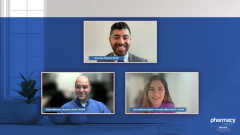
Bispecific Antibodies in DLBCL: Therapeutic Potential
Robert Mancini, PharmD, discusses current DLBCL (diffuse large B cell lymphoma) management approaches, relapse rates, frontline, and subsequent therapies, including emerging treatments like bispecific T-cell engagers and monoclonal antibodies.
Episodes in this series

In a Pharmacy Times Practice Pearls program, Zahra Mahmoudjafari, PharmD, MBA, BCOP, FHOPA, a clinical pharmacy manager at the University of Kansas Health System, along with panelists Robert Mancini, PharmD, and Amir Ali, PharmD, BCOP, delve into the evolving landscape of bispecific antibodies in diffuse large B-cell lymphoma (DLBCL). The discussion emphasizes clinical effectiveness, safety, and management strategies in the context of innovative immunotherapy agents.
Mahmoudjafari introduces the discussion, emphasizing the promising therapeutic potential of bispecific antibodies. Mancini sheds light on DLBCL management, explaining its aggressive nature and high relapse rates despite initial treatments like archtop variations and radiation therapy. He notes the inevitability of relapse in 30% to 40% of patients, necessitating second-line treatments such as chemotherapy, autologous transplants, or chimeric antigen receptor T-cell therapy. Ali, a clinical pharmacist at the University of Southern California, contributes expertise in hematology and bone marrow transplants to the conversation.
The panel highlights evolving treatments like antibody drug conjugates, bispecific T-cell engagers, and monoclonal antibodies, emphasizing individualized approaches based on factors like relapse patterns and responses to prior therapies. The focus remains on assessing clinical evidence, trial outcomes, and safety profiles, while acknowledging the need for further exploration in this ever-progressing field of lymphoma management.
Video synopsis is AI-generated and reviewed by Pharmacy Times® editorial staff.
Newsletter
Stay informed on drug updates, treatment guidelines, and pharmacy practice trends—subscribe to Pharmacy Times for weekly clinical insights.























